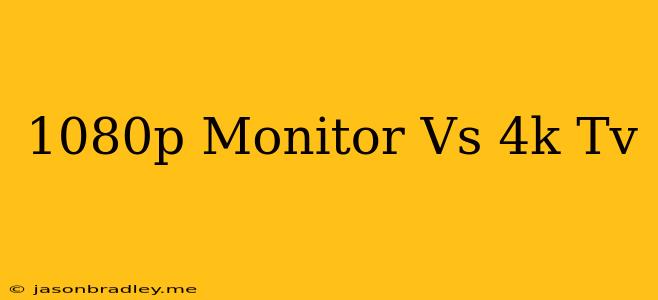1080p Monitor vs 4K TV: Which is Right for You?
Choosing between a 1080p monitor and a 4K TV can feel overwhelming, especially with the abundance of options on the market. To make an informed decision, let's delve into the key differences between these two display technologies:
Resolution: The Defining Difference
The most striking distinction is resolution. 1080p displays boast a resolution of 1920 x 1080 pixels, while 4K TVs offer a whopping 3840 x 2160 pixels. This translates to four times the number of pixels on a 4K screen, resulting in significantly sharper images and more detailed visuals.
Size Matters: Choosing the Right Fit
Size plays a crucial role in deciding between a 1080p monitor and a 4K TV. While a 1080p monitor generally works best for screens up to 27 inches, pixel density starts to decline beyond that, making the image appear less crisp. On the other hand, 4K TVs shine at larger sizes, typically 43 inches and above, where the extra pixels truly come into play.
The Upscaling Advantage of 4K TVs
Many 4K TVs employ upscaling technology to enhance the quality of 1080p content. While it won't magically transform a low-resolution image into true 4K, it can significantly improve clarity and sharpness compared to a 1080p monitor.
Beyond Resolution: Other Factors to Consider
Price: 4K TVs are generally more expensive than 1080p monitors, especially at larger screen sizes. Refresh Rate: Some 1080p monitors offer higher refresh rates (144Hz or even 240Hz) than 4K TVs, crucial for gaming and fast-paced action. HDR Support: Both 1080p and 4K displays offer HDR support, enhancing contrast and color depth. Input Lag: For gamers, low input lag is essential. While both technologies have advanced significantly in this area, 1080p monitors often have a slight edge.
The Verdict: 1080p Monitor or 4K TV?
The choice depends on your specific needs and priorities:
1080p monitor:
- Best for: Gaming, productivity, smaller screen sizes
- Pros: Lower price, higher refresh rates, potentially lower input lag
- Cons: Limited resolution, pixel density issues at larger sizes
4K TV:
- Best for: Movie watching, entertainment, larger screen sizes
- Pros: Exceptional image quality, upscaling technology, immersive viewing experience
- Cons: Higher price, potentially lower refresh rates, may require a more powerful PC for gaming
Ultimately, the ideal choice comes down to your budget, screen size requirements, and intended usage. Carefully consider these factors before making your decision!
